Do you know why Beagles are hard to train? If you find your spirited friend often turning a deaf ear to commands, it's not just you—training a Beagle can be uniquely challenging. This guide is essential for you; uncover proven strategies that engage your Beagle's quick mind and transform those frustrating training sessions into successful, bonding moments. Don’t wait—start seeing results today!
Key Takeaways
- Beagles have an independent streak stemming from their hunting heritage, requiring clear leadership and patience to overcome training challenges such as stubbornness and the instinct to follow their noses.
- Positive reinforcement and incorporating play and a beagle’s scent-tracking ability into training can engage them effectively, while a consistent daily routine aids in managing their high energy levels for better focus.
- Starting training early with beagle puppies, keeping training sessions short, and understanding beagle body language and vocal cues are crucial for effective training and building a responsive, well-behaved companion.
Find out how to train your beagle to be the well-behaved pup you desire – Read Free Report
The Stubborn Streak of Beagles
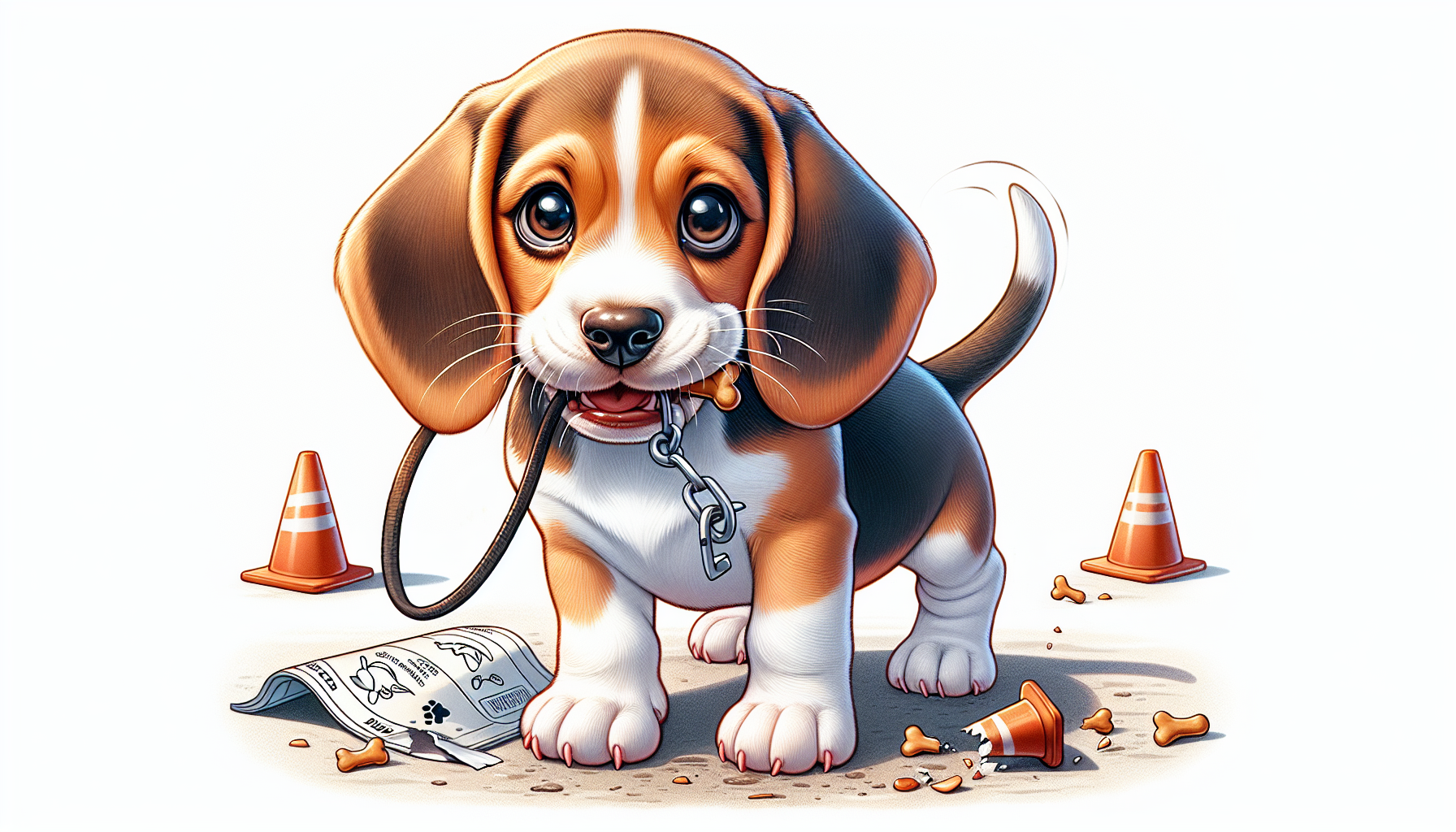
Image created using AI
Beagles, one of the many dog breeds, are known for their determination and independent personality traits, making them both charming and challenging companions. Their stubborn streak is not a flaw but a feature of their breed, deeply rooted in their history as scent hounds originally bred for hunting. This tenacity, while admirable, can manifest as an obstacle during training sessions, setting them apart from other breeds.
Beagles often exhibit stubborn behavior if they do not fully understand what is being asked of them. This sense of independence, coupled with their strong scenting abilities, requires clear and effective communication from the trainer.
The Independent Nature
The beagle’s independent nature stems from their history as hunting dogs, where they had to rely on their instincts and decision-making skills as intelligent dogs. This trait can show up during training as a form of stubbornness when they prioritize their own desires over commands, similar to what can be observed in border collies.
Consequently, beagles may only respond to commands if they see their beagle owners as strong and confident leaders, which underscores the importance of establishing clear leadership during training.
Overcoming Stubbornness
Overcoming the stubbornness of a beagle requires patience and consistency. Consistent training sessions that build upon foundational skills, such as the ‘Sit’ command, can gradually increase a beagle’s responsiveness. It’s important to remain consistent not just in the commands used but also in the daily schedule of training activities.
And while treats can be an effective motivator, relying solely on them is not enough for long-term learning; instead, it’s crucial to consistently reinforce commands to ensure that beagles retain the skills taught.
The Role of Positive Reinforcement
Positive reinforcement plays a crucial role in encouraging a beagle to repeat good behavior. By utilizing food rewards and verbal praise, beagles find the training process both beneficial and pleasurable. This approach not only strengthens the desired behaviors but also helps to build a positive relationship between the dog and the owner.
Scent Hounds with a One-Track Mind
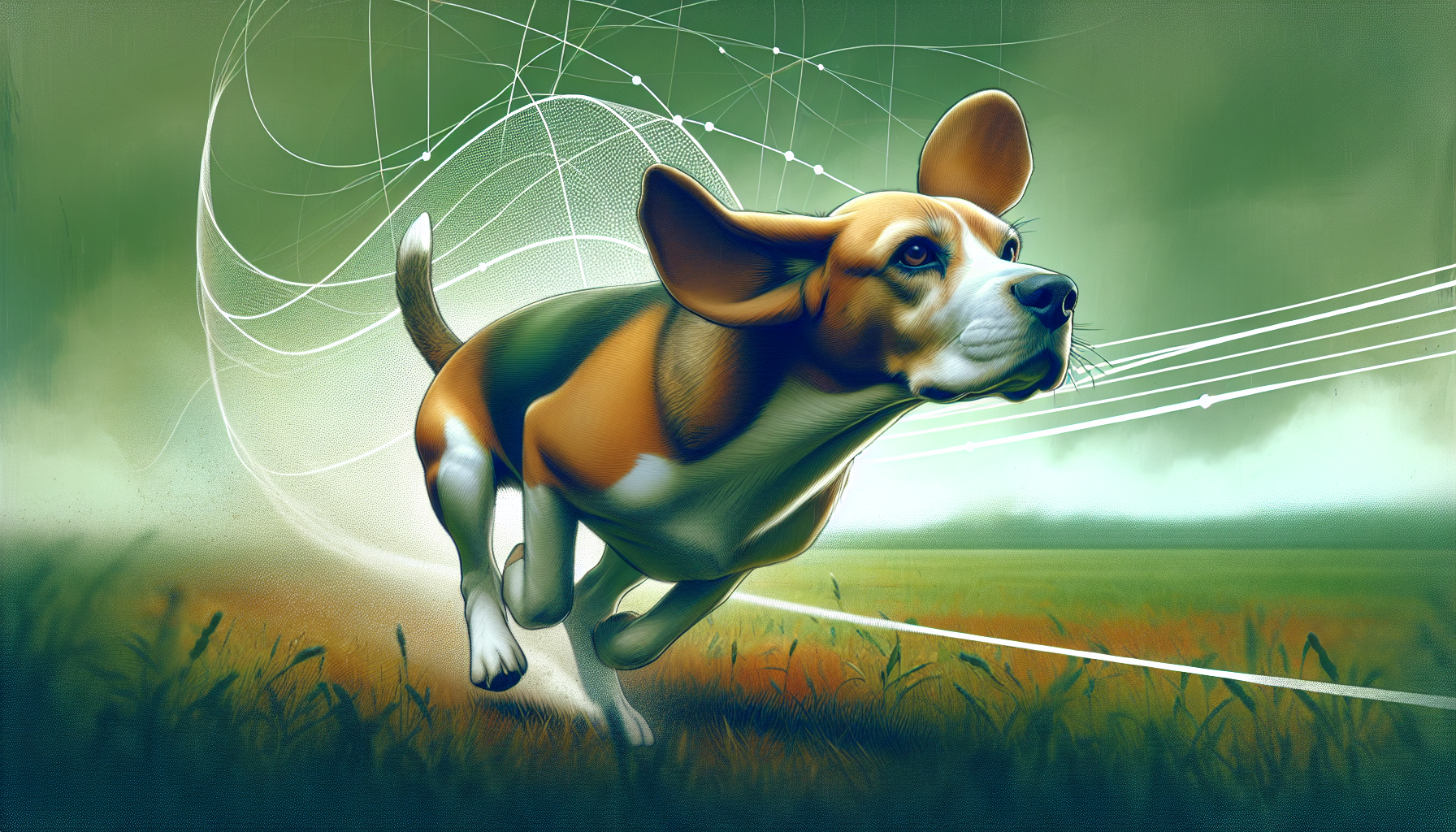
Image created using AI
Beagles’ powerful sense of smell can easily lead them astray from the task at hand, as they are constantly bombarded with a kaleidoscope of scents. Their original role as hunting dogs has instilled in them a strong inclination to follow their noses, which can often take precedence over obedience to commands. This one-track mind can be a significant hurdle to overcome during training sessions.
Harnessing the Nose
Incorporating a beagle’s natural scent tracking abilities into the training regimen can turn a potential distraction into a powerful training tool. Here’s how you can do it:
- Create an item with a distinct smell, such as a cotton swab soaked in fragrant oil.
- Teach your beagle to associate that scent with rewards.
- Use the scented item as a training tool to introduce the concept of scent training.
By following these steps, you can effectively utilize your beagle’s scent tracking abilities in their training.
Activities such as tracking, obedience, and agility training that utilize the beagle’s scenting abilities not only provide mental stimulation but also make training an engaging and rewarding experience for them.
Minimizing Distractions
To foster focus during training, it is essential to minimize distractions. This is particularly true for beagles, whose attention can easily be hijacked by competing scents. Creating a training space that limits these distractions can be incredibly effective in maintaining a beagle’s attention on the trainer and the tasks at hand.
Engaging Their Natural Instincts
Scent games are an excellent way to engage a beagle’s sniffing instincts, providing mental stimulation that is both fun and educational. Games like hide-and-seek with treats or using puzzle toys can captivate a beagle’s interest, utilizing their natural behaviors to encourage learning and obedience.
High Energy Levels Demand More
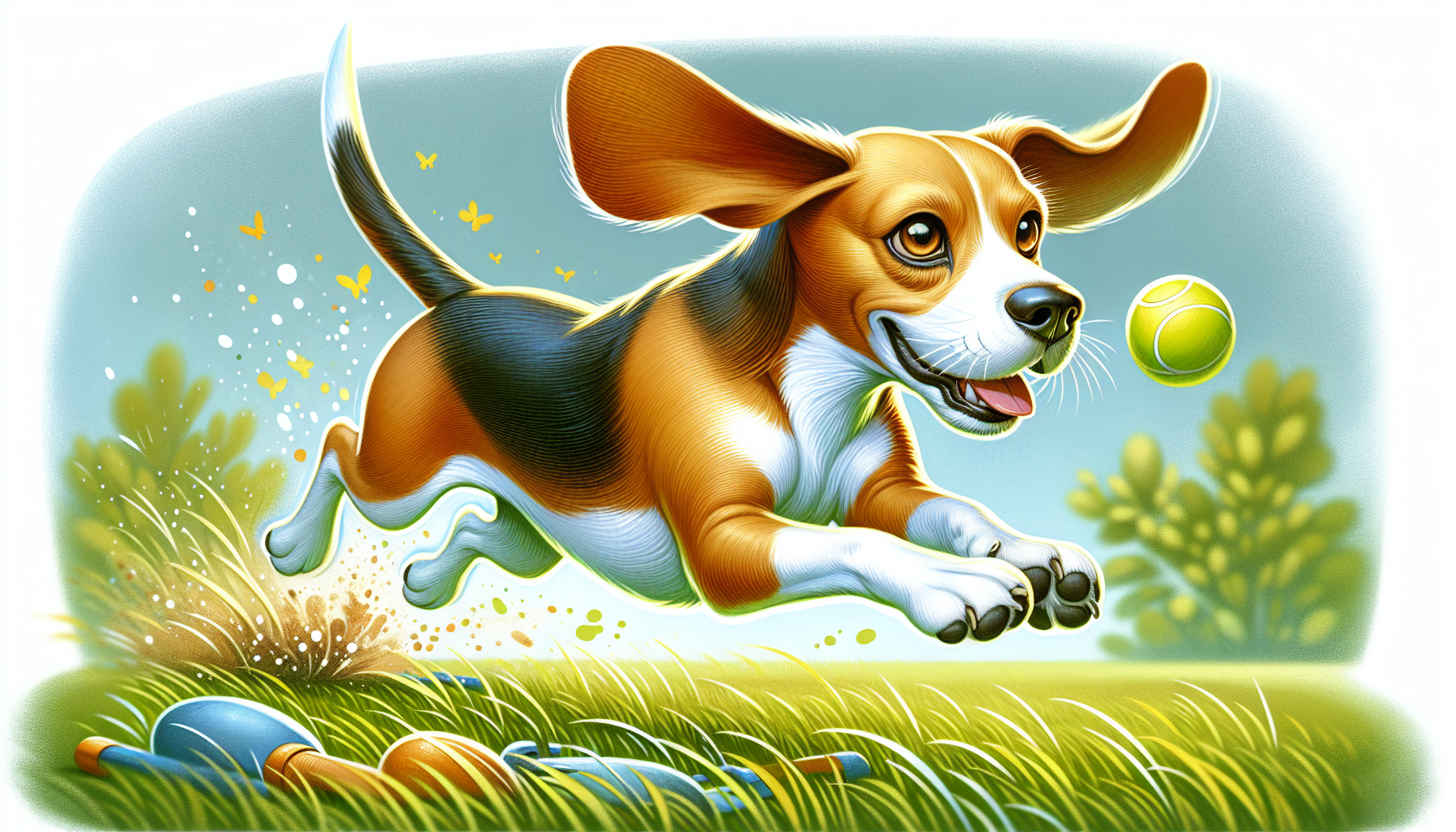
Image created using AI
Managing a beagle’s high energy levels can be quite the task for any dog owner. These energetic dogs are not content with sitting idly by—they crave movement and stimulation, making it challenging to keep them still and attentive during training. Proper engagement and management of their energy are crucial for a productive training session.
Managing Energetic Dogs
Engaging beagles in physical activities like play or a walk before training can help to expend some of their boundless energy, making them more inclined to focus during training sessions. A routine that includes ample exercise not only assists in managing a beagle’s energy but also builds the consistency that can enhance their focus during training.
Incorporating Play into Training
Playful activities like agility training can be seamlessly integrated into training sessions, maintaining a beagle’s interest while providing a physical and mental challenge. Allocating time for play and exploration can serve as positive reinforcement, which is crucial for bonding and effective training.
Setting a Daily Routine
A consistent daily routine is essential for effective beagle training. Balancing physical activities with training time and opportunities for mental stimulation within a daily schedule can significantly improve a beagle’s receptiveness to training.
Beagle Puppies: Early Training Matters
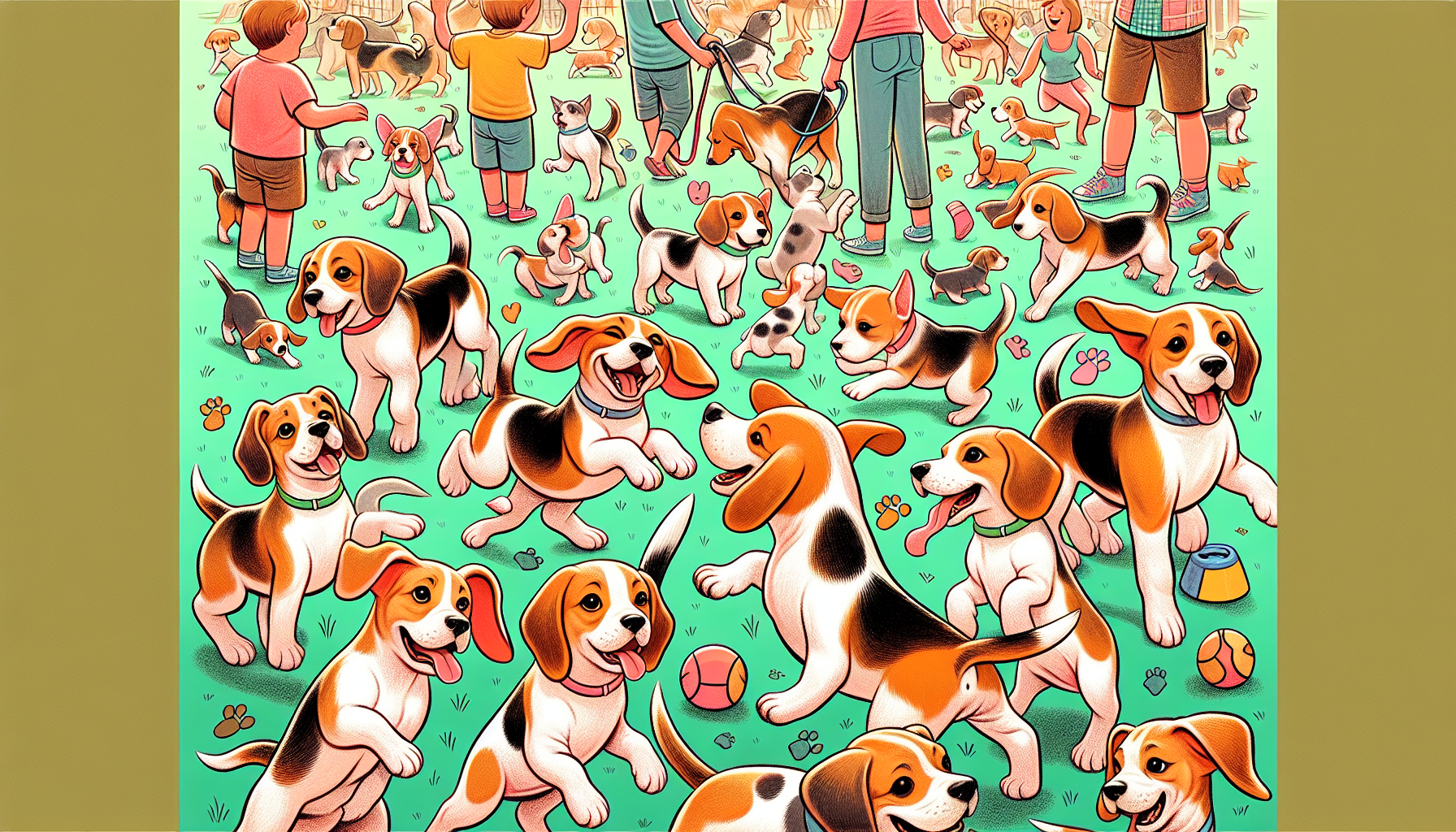
Image created using AI
Beginning training during the puppyhood stage is critical for shaping a well-behaved adult beagle. Introducing consistent routines early on sets the groundwork for future learning and behavior, leveraging the natural curiosity and intelligence of beagle puppies.
Socialization with Other Dogs
Socialization is a key component of a beagle puppy’s development, helping them to grow into well-adjusted adult dogs. Exposing them to a variety of dogs, people, and environments early on can significantly contribute to their overall social skills. A beagle puppy home that prioritizes socialization will ensure a positive outcome for the puppy’s growth.
Basic Commands and Crate Training
The foundation of a well-trained beagle begins with mastery of basic commands like ‘Sit’ and ‘Stay’, which establish obedience and boundaries. In conjunction with this, effective crate training provides a secure space for the puppy, integral to their overall routine and house training.
Consistent House Training
Consistency is the cornerstone of successful potty training for beagle puppies. Establishing a routine that includes frequent outdoor breaks is crucial for their house training success.
The Challenge of Maintaining Focus
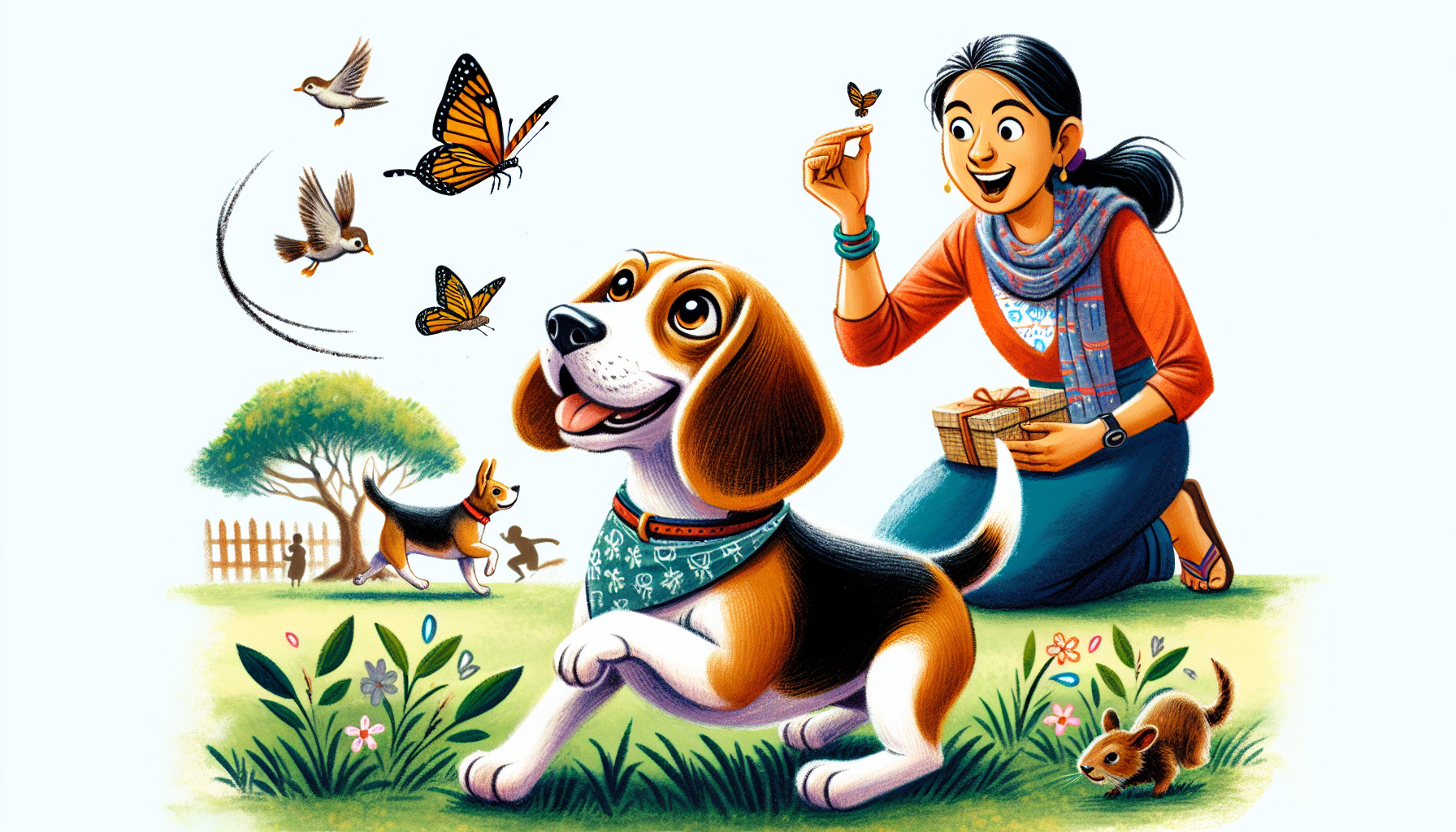
Image created using AI
Beagles are prone to quick distractions due to their short attention spans, which can make maintaining their focus during training sessions a challenge. Utilizing high-value treats during training can help retain their attention and make the process more effective.
Keeping Training Sessions Short and Sweet
Short and frequent training sessions are recommended for beagles, as these match their attention span and enhance learning effectiveness. Food rewards, in particular, are likely to elicit a positive response from beagles, making them an important element of training.
Building Up Concentration Gradually
Gradually increasing the duration of training intervals can help beagles improve their concentration over time. Starting with brief sessions and progressively lengthening them allows beagles to develop their focus in a manner that suits their natural pace.
Rewarding Good Training
Frequent and timely rewards are essential for maintaining a beagle’s focus during training. High-value treats, given at the moment of compliant behavior, can significantly encourage cooperation and reinforce the action being trained.
Understanding Beagle Behavior and Communication
Decoding the body language and vocal cues of beagles is an indispensable part of effective training. Recognizing these signals can help owners understand their beagle’s emotions and intentions, allowing for a more responsive and considerate training approach.
Reading Beagle Body Language
Understanding a beagle’s body language provides valuable insights into their emotional state, which can be particularly useful during training sessions. Recognizing signs of happiness or stress can help trainers adjust their approach accordingly.
The Importance of Vocal Cues
Utilizing consistent vocal cues and intonations can significantly impact a beagle’s obedience. Beagles benefit from clear and consistent communication, making it easier for them to follow commands and learn effectively.
Responding to Your Beagle's Needs
Responding to a beagle’s needs and providing mental stimulation are key components of a strong owner-dog relationship. This is especially true when it comes to training, where understanding and meeting the dog’s needs can lead to a more harmonious and successful process.
Summary
Training a Beagle might come with its challenges, but embracing their nature transforms the process into a rewarding journey. By understanding their instincts, managing their energy, and applying consistent, positive reinforcement, you can forge a deep connection with your Beagle. Tailored strategies that respect their scent-driven curiosity can make training not only effective but also enjoyable. Embrace the journey with your spirited Beagle, and watch as your bond strengthens and their training progresses, turning challenges into triumphs.
Frequently Asked Questions
Why is positive reinforcement important in training beagles?
Positive reinforcement, like food rewards and verbal praise, encourages beagles to repeat good behavior, making training enjoyable and beneficial for them.
How can I manage my beagle's energy before a training session?
Before a training session, take your beagle for a walk or engage in play to help manage their energy and increase their focus. This can make them more receptive during the training session.
What are some effective ways to keep my beagle focused during training?
To keep your beagle focused during training, try short, frequent sessions with high-value treats, minimize distractions, and gradually build up their concentration through regular exercise. This will help improve their focus significantly.
At what age should I start training my beagle puppy, and why?
Start training your beagle puppy as soon as it arrives home to leverage its natural curiosity and intelligence, setting the foundation for future learning and behavior.
How can I tell if my beagle is stressed during training?
Pay attention to your beagle's body language during training – signs of stress may include cowering, raised hackles, and hard eyes. It's essential to adjust your training methods to keep your dog calm and responsive.
Learn how to train your beagle to be the well-behaved dog you desire –> Access our Free Report
Shop for beagle-themed products and gifts that beagle enthusiasts will love.

